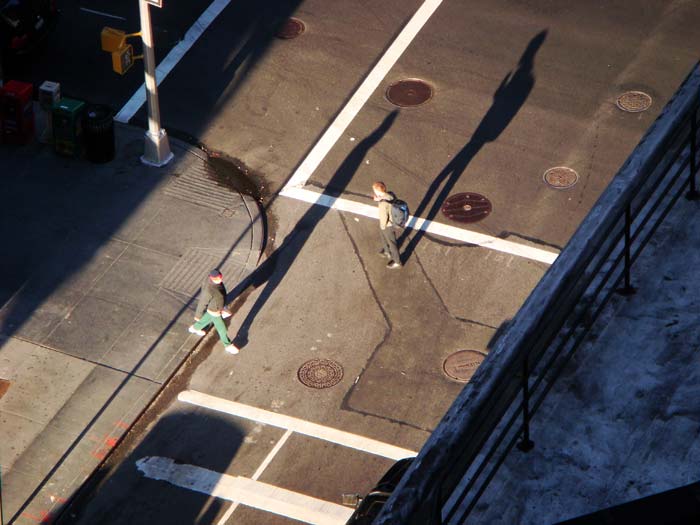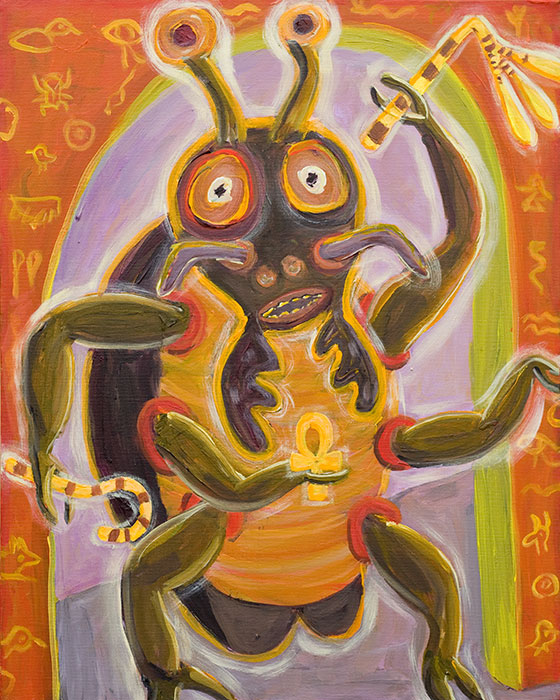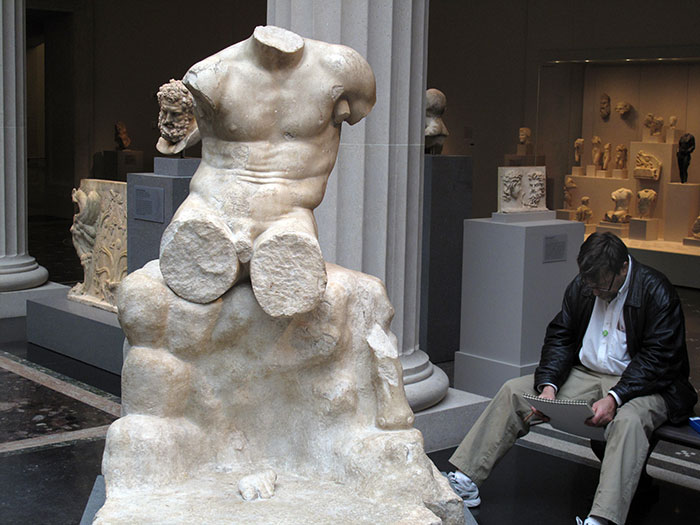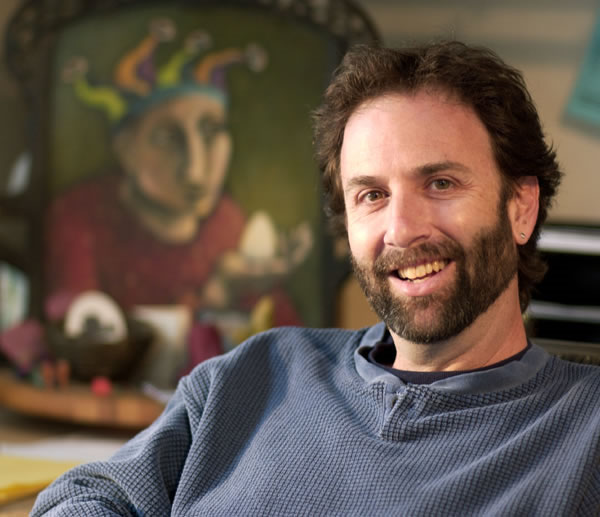
The Palmetto Man
by Danny Rubin

Nobody knows exactly what happened in that laboratory so many years ago. Still, it’s not difficult to imagine, given that Kim and Aldo could afford to go nowhere else at the time, and the lab staff, although highly competent did have a tendency towards sloppiness. Had somebody said, “Let me just have one more look around before we close up for the holidays,” that one petri dish would never have been left out on the counter over the weekend.
Keep in mind that a laboratory is just a room that, if anything, bears some striking similarities to a kitchen. Things there are cooked, refrigerated, mixed, boiled, and left to simmer. In both, floors and counters must be kept clean, especially when the place is being vacated for the weekend.
When the scientists returned from their well-deserved break (after all, did they not give Kim and Aldo the miracle of birth?) the forgotten petri dish was finally spotted, label checked, and project officially terminated.
Then whose fault was it? Please consider that the human egg is small. Really small. Even trained lab technicians with great vision would see nothing. So nobody could have known when the assistant took out the trash that something from the petri dish was missing.
Pause briefly for a philosophical note: one man’s garbage may be another’s bundle of joy.
Meanwhile, years pass, Aldo’s weekend carpentry turns into the NIFTY Construction and Rehab Corporation, and Kim, no longer sweating through long hot days at the laundry, spends leisure hours by the pool.
Their son had grown to a normal height and appearance, irrespective of his extrawombal conception. Maurice is twenty-two and teetering on the brink of marriage. He lives in an apartment recently rehabbed by his father’s company, free of rent in exchange for his services as manager of the building.
It is only fair to warn you at this point that the laboratory which twenty-three years before had facilitated Maurice was no longer in existence. The lab building itself was not demolished, but purchased by the NIFTY Construction and Rehab Corporation and converted into an apartment complex, now occupied and managed by Maurice.
The irony of this situation is a result or Aldo’s keen understanding of the similarities between a laboratory and a kitchen. Gas lines once reserved for Bunsen burners now fueled ranges and heating units. Sinks and faucets—done. Even emergency shower units, once used as a safety backup in case of fire or chemical sloppiness, were present for everyday use. Counter space was abundant as was cabinet space, and in move that catapulted Aldo to national prominence, Pyrex glass beakers, Erlenmeyer flasks and graduated cylinders were retained from the lab at a low price and introduced to tenants and kitchen stores as a cookware fad, which swelled to a national mania for two Christmas seasons and died.

It was two in the morning and Sherry was hungry. She slipped out of the covers without disturbing Maurice, and stumbled her way through the dark. She paused in the doorway of the kitchen to get her bearings, but the silence that should have followed her sudden stillness seemed to be filled by a gentle shuffling around the kitchen. A longtime city dweller, Sherry had no illusions about kitchen creepings while humans slept. But she wasn’t asleep now, and she hoped the light would send the creatures back into the cracks and hollows of the converted laboratory.
Running her hand up and down the wall by the doorway, her fingers settled on the switch. The bright flash temporarily blinded her, but as she blinked the kitchen into focus something blurred past her, off to the left. She thought she saw the cabinet under the sink firm up as if just closed, but attributed the distortion to her adjusting vision.
Slipping back into bed, Sherry hesitated briefly while considering whether to brush her teeth now or wait until morning. A sleepy Maurice smiled up at her. “You look beautiful.”
“Thank you,” she said. “You’ve got roaches.”
To dispense quickly with the events that followed, Sherry did indeed brush her teeth and Maurice, after one or two reminders, did spray the apartment for roaches.
“It smells awful,” complained Sherry.
“That’s the oil,” explained her handy and knowledgeable lover. “It makes the poison stick to their feet.”
That night. Sherry couldn’t sleep. As a city dweller, she knew that the poison would drive the roaches out of the walls; however, it was two o’clock in the morning, and her stomach was rumbling. Putting on her slippers to avoid stepping on anything crunchy, she worked her way into the kitchen and braced herself before turning on the light.
Pause for a philosophical note: you don’t know everything, do you?
It took her a second to become adjusted to the light, and the bodies of dozens of roaches, on their backs and kicking, flashed into her brain all in that blurry second. Yet her attention was drawn instantly to something else. It was Maurice. But hadn’t she left him in the bedroom just moments ago? Yet here he was, completely naked, sitting on the counter with his feet in the sink and the water running.
For a moment their eyes locked, but the moment passed and the figure dropped down to the floor and darted into the cabinet below the sink.
Sherry felt dazed, unable to move. Had she not just walked into the kitchen and seen Maurice sitting on the counter washing his feet? No, not Maurice. A filthy, naked, longhaired animal with wild eyes.
She began to move back towards the bedroom since a scream was not forthcoming, only to be stopped by the sound of a little cough, coming from the sinkal region of the kitchen. She turned as the figure burst from its crack, seemingly unable to breathe, and, giving her a desperate glance, it bounded up onto the counter island and flipped on the sink faucets.
“Who are you?” Sherry whispered. The creature paid no heed, though cautiously watched her as he rapidly—in a bug-like motion—ran his hands under the water and washed his feet.
Sherry didn’t know how why, but she felt her own sense of caution melt into compassion for the sink-creature. As for the creature, he turned off the faucet and stared at Sherry, who felt his eyes and blushed. For she was as naked as he was, save for the slippers on her feet. Her hair was long and dark red, almost brown. The creature glanced down to the sink and saw a distortion of his own reflection, then suddenly dropped to the floor and scurried along the floorboard to some hidden flaw in the kitchen workmanship where he disappeared.
A dazed and dream-like Sherry returned to bed where she found Maurice snoring through a fantasy that could in no way compete with what she had just seen. She resisted the urge to wake him, and somehow fell into a very deep, very restful sleep.
What followed was this: Sherry continued her habit of snacking in the middle of the night, only now she made a point of eating over the floor so as to leave crumbs, and to always leave the cutting board covered with the seeds and juice of sliced tomatoes. Once she went so far as to leave some ground beef defrosting in the sink, knowing full well it would not be there when she awoke. And it wasn’t.
In this way, she gradually gained the confidence of the sink creature, her personal discovery, her secret.
One night the creature emerged while Sherry was standing over the sink, eating. She offered him a bite of the sandwich and he took it. Didn’t even ask what it was. How uncomplicated. Sherry was elated.
In the months that followed Sherry named the creature “Peter,” and proceeded to teach him English and the American customs. She was amazed at his rapid progress. Apparently, throughout his life he had spent his daylight hours, not idly dozing like his brothers and sisters, but listening through the wall cracks to the scientists as they worked. As a result, his science, math and deductive reasoning were excellent, while he found himself somewhat weaker in the humanities.
One weekend Maurice was called out of town on a Spackle convention, and Sherry spent the entire time at his apartment. She threw Peter into the bathtub and gave him the first good scrubbing of his life.
“I always knew I was different from the others,” he said in his now perfect English. “That can be hard on a kid. But with my size I found I could scavenge enough food in a single night for all of my brothers and sisters and cousins and uncles and neighbors. And my mother would never go hungry again.”
Sherry liked the sound of that. “Peter, you’re so unselfish.”
“Well,” he said. “I guess it comes from growing up in a large family.”
There could be no doubt that Sherry was being sucked into an attraction to this man, this cockroach.

You may imagine at this point a mad passion visiting upon the night, an eternal moment of bug-love, enveloping these two in spontaneous, guileless ecstasy, one of the rare moments enjoyed in this life by anyone, man or insect. Perhaps this took place and perhaps it didn’t, the real story being nobody’s business but theirs. Suffice it to say that if it did happen, it was an isolated event and there were no children.
That night Sherry cut Peter’s hair and gave him a shave. There was no doubt about it. The resemblance was remarkable.
“Where did you come from”?” she asked.
Peter looked at himself in the mirror, admiring his new image. “I was adopted.”
Adopted? Sherry knew about the kitchen-laboratory thing and the following day presented her new theory to Maurice—who did not take it well.
“You mean, I was a test tube baby’?” he asked his parents during a tense summer supper by the pool.
“That’s not how we think of you,” explained Kim. “You will always be our only son.”
Sherry choked on her lemonade. Her secret would have to come out sooner or later. But was Peter ready yet?
Now it was Maurice’s turn to have sleepless nights. Something was bothering him. Not just the revelation about his birth, but something was wrong with Sherry. She seemed distant, distracted. It had been like that for a while, but ever since he’d left on that convention he was sure something was wrong.
Finally he got the courage to ask her. “It’s someone else, isn’t it?”
Pause briefly for a philosophical note of your own choice.
The confrontation did arrive, not that night but unexpectedly, on a night that Sherry had decided to stay home and reread Charlotte’s Web. Maurice got up after hearing something in the kitchen. When he turned on the light, there stood Peter, freeing relatives from a roach motel.
The scuffle that could have ensued did not, as their eyes locked in on each other, each amazed at the reflection of his own features. Maurice finally cleared his throat and spoke.
“That’s my shirt,” he said.
As it turned out, Peter and Maurice were exactly the same size, and were able therefore to exchange clothing between them. But because Peter had no clothing of his own, Maurice soon learned that once again he was getting the short end of the stick.
Sherry’s relationship with Peter had become quite strong, maybe even eclipsing her relationship with Maurice. Such was not lost on Maurice who learned of all the secret meetings between Sherry and Peter, and did not react in a sane manner.
“He’s nothing but a cockroach!” Maurice snorted.
“That’s not so,” Sherry defended. “He’s too large to be a cockroach.”
“Then what is he, I’d like to know?”
“He’s a Palmetto bug!” she cried.

Such discussions were fruitless, but the important thing was that Peter had come out of the closet. Maurice naturally would not permit him to go on living under his roof, brother or no brother, but, luckily, Kim and Aldo were more accepting.
Feeling somewhat stunned by the news of their newfound son, but overcome by the social possibilities offered, Kim and Aldo embraced Peter, part man, part Palmetto bug, and welcomed him into their home. At a huge banquet, thrown in Peter’s honor, Peter impressed guests from all areas of society, art, and science with his knowledge of entomology.
With one identical brother on each side of her, Sherry sat, proud, confused, bookended. She alone knew the torment facing the man on her right, the man who so suavely sported a dinner jacket, yet would forever feel naked without an exoskeleton. And on her left, another tormented man, a decent man who would never know the joys of molting.
The dinner proceeded splendidly until the double heart attack. Kim and Aldo were wheeled to the nearest hospital, where doctors and nurses had never seen anything like it, and the rest of the party kind of broke up after that.
Maurice was crushed, but somewhat consoled by the thought or his inevitable inheritance.
“You’ll only get half,” considered Sherry, who approached him as he sat on the staircase above the living room.
“Well,” considered Maurice, “he is my brother.”
Maurice’s complete grasp of the high points of this situation flowed through Sherry like something wet, and the love lost between them for so many months got found.
By now it was nearly dawn. Allowing for the fact that it had been an incredible night, full of celebration and sadness, tragedy and triumph, it must still be pointed out that nobody remembered to clean up the kitchen.
Wondering what happened to Peter, Sherry and Maurice had begun looking around the huge house. Suddenly, there was a scream and the howl of a wild man. They rushed for the kitchen to find Peter attacking one of the servants.
“What’s going on here?” Maurice inquired while trying to separate the two men.
“I just came down for a snack,” said the old man. “I found the place infested. And then HE attacked me!”
Peter pushed them all away, grief and anger springing from his eyes. “Get away! All of you! Just stand back!”
“Peter! What’s going on?” Sherry cried.
Finally she saw it. There on the floor of the kitchen, brutally squished, legs still kicking.
Pete knelt down, slowly, tears streaming down his face. After the longest silence, he stood, and ran out the door. He did hesitate just long enough to catch Sherry’s sad stare and return his own, but that was all. He was gone. Maurice cleared his now stricken throat.
“We both lost a mother tonight, you know.”
“Yes,” Sherry nodded. “Only he lost two.”
There could be no doubt that Peter would never be able to live among the humans as one of them. The primitive juices that claim him will never let him go, no matter how strong the urge of his natural species. Perhaps you imagine him now, creeping through the cracks of your own walls, waiting for you to sleep, sneaking crumbs from your dirty kitchen, but that isn’t the case at all. The truth is that in his haste to leave human civilization, he was caught off guard while crossing the street and run over by an Orkin truck.
Sherry and Maurice were married, there was trouble with conception, and Maurice sought out a medical laboratory to bring about the same miracle that had removed the twinkle from his own mother’s eye and put it in a petri dish. This new laboratory was less sloppy than the first, but a twinkle is a heck or a thing to contain. Sherry got her son, and the rest of the eggs were locked in the laboratory freezer to prevent both kidnapping and spoilage. Where they remain, most likely.
About the Author

Photo Credit: Francis Donald
After many years writing for professional theater companies as well as scripting industrial films and children's television, Danny Rubin began writing screenplays. His screen credits include Hear No Evil, S.F.W., and Groundhog Day, for which he received the British Academy Award for Best Screenplay and the Critics' Circle Award for Screenwriter of the Year, as well as honors from the Writers Guild of America and the American Film Institute.
Rubin has taught screenwriting in Chicago at the University of Illinois, Columbia College, and the National High School Institute; at the Sundance Institute in Utah; the PAL Screenwriting Lab in England; the Chautauqua Institution in New York; and in New Mexico at the College of Santa Fe. He is currently the Briggs-Copeland Lecturer on Screenwriting at Harvard University.
Rubin is married to architect and web-designer Louise Rubin with whom he shares two children and two dogs.
More recent news: "Groundhog Day" has been produced as a Broadway play. See Rubin's Blogus Groundhogus for updates.
Please mention the author or this piece's name in your comment.